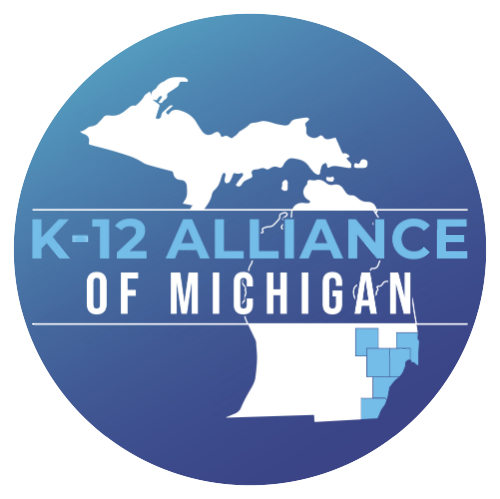School Groups Send Joint Letter to Legislative Leaders Sharing Critical Budget Needs
Leaders of a number of education advocacy organizations signed a letter to the Michigan legislature today, outlining the budget priorities necessary to allow schools across the state to invest in the programs that will support the success of the next generation of Michigan students.
The letter, signed by The K-12 Alliance of Michigan, Michigan Association of School Administrators, Michigan Association of Intermediate School Administrators, Education Advocates of West Michigan, Michigan Alliance for Student Opportunity, Michigan Association of Secondary School Principals, Michigan Association of School Boards and Calhoun ISD (on behalf of a consortium of ISDs from Southern Michigan), outlines the importance of creating permanent investments in our K-12 schools that will directly support the needs of both students and teachers.
Of particular need, according to the school leaders, is ensuring the state’s Section 147 payments to the retirement system debt are continued. Doing so would directly pay down the rate Michigan’s local school districts have been obligated to pay out of their per-pupil foundation allotment every year, permanently freeing up, on average, $500 per-pupil in spending for every school in Michigan, all without raising taxes or cutting other programs.
“Thanks to the leadership of Governor Whitmer and the continued fiscal responsibility of our legislature to pay down these debts, we have a historic opportunity in this year’s budget to significantly and permanently increase the spending schools are able to direct towards their students, all without new taxes or cuts to other programming,” said Robert McCann, Executive Director of The K-12 Alliance of Michigan. “We look forward to working with the legislature to make this a priority as they put together their budgets in the coming weeks to ensure we are giving the next generation of Michigan students the support and opportunities that they deserve.”
Currently, Michigan’s traditional public school districts are forced to send approximately 21% of their payroll costs right back to Lansing to cover the unfunded liabilities in the state’s educator retirement system, resulting in hundreds of millions of dollars intended to fund student programming instead returned to Lansing every year.
Earlier this year, Governor Whitmer announced that the healthcare portion of the educator retirement fund (known as OPEB) is projected to be 140% funded, creating this once-in-a-generation opportunity to permanently reduce the financial burden these unfunded liabilities have placed on each and every school in Michigan for years while ensuring OPEB stays fully funded.
“These legacy costs were the result of decisions made by lawmakers decades ago and making this change could significantly reduce the burden on our districts, and, ultimately, our students,” added Tina Kerr, Executive Director of the Michigan Association of School Administrators. “Because of the sacrifices made by our public school districts and their employees, we are now in a position to reinvest some of these savings back into the classroom where they belong. As an added bonus, keeping these funds in our districts also has the potential to positively impact our educators and bring more into the profession.”
By continuing to allocate the state’s Section 147 spending into the retirement fund, it would responsibly pay down the rate our local schools are required to spend by over 7% in FY 2024-2025 and would grow every year due to payroll costs that would be reduced along the way, all while maintaining the stability of the retirement fund as a whole.
The letter additionally noted the need to reflect the inflationary cost increases schools are facing in the budget, lowering and ultimately ending transfers out of the school aid fund and the importance of finalizing the school aid budget by June 1 so that schools can develop their own budgets by their July 1 deadline.
# # #

